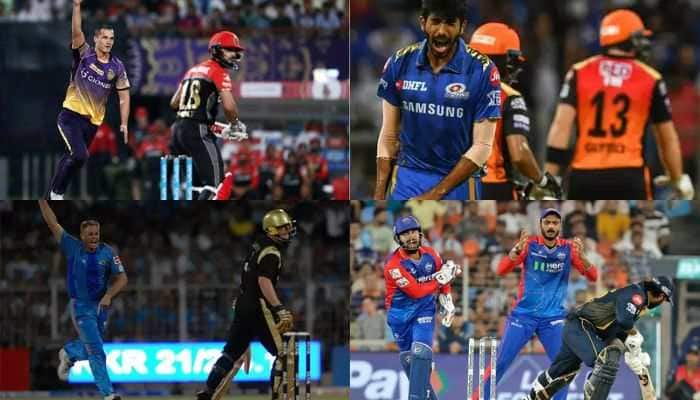‘Terror groups still active in Iraq’
The Parliamentary Elections in Iraq on March 7 will be a crucial test for the country’s young democracy.
Trending Photos
)
 The Parliamentary Elections in Iraq on March 7 will be a crucial test for the country’s young democracy. Iraq’s current political minefield is so volatile that the outcome of the polls could unleash an ethnic and sectarian disaster in the country, which is trying hard to attain stability after the US invasion ousted Saddam Hussein.
Iraq’s political landscape is also too chaotic, since 306 political entities are registered to contest just 325 seats in the Parliament or Council of Representatives.
The Justice and Accountability Commission (JAC) has already sowed the seeds of turmoil by banning around 500 candidates from participating in the polls because of Ba’athist links. Notably, Shia politicians dominate the panel that prepared the list of banned candidates. Some Sunnis see it as an attempt to marginalise them. However, the list is said to have targeted secular alliances as it had more Shia than Sunnis.
In an exclusive interview with Kamna Arora of Zeenews.com, Rachel Schneller, an expert on Iraq, discusses the political environment in the Middle East country and the probable outcome of Parliamentary Elections.
Rachel Schneller is a diplomat in residence at the Council on Foreign Relations.
Kamna: What is the significance of Iraq Parliamentary Elections 2010?
Rachel: The new Iraqi government will inherit a fragmented and still unstable country, and will likely be responsible for either turning the country onto the path of stability, or another period of renewed violence.
The last Parliamentary Elections were held just over five years ago, on December 15, 2005. A few months following those elections, Iraq went through a very violent period in 2006 and 2007 that some called civil war. Millions of Iraqis fled the country and others became internally displaced. Infrastructure was destroyed, the country was so violent that it had much difficulty in attracting foreign investments, the economy suffered and the quality of life for the average Iraqi diminished substantially.
The key things to watch out for during the March 7 elections will be Sunni participation, allegations of fraud, and how quickly the new government can be formed following the elections.
The Sunni groups have indicated they will not boycott the elections, but we will have to see how many turn out to vote on the election day. Previous elections in Iraq were well-run, free and fair, so the likelihood is that these will be too. In my view, the crucial factor will be the ability of a new government to agree on a new prime minister and appoint new ministers.
If a government cannot be formed soon, or if the new government is weak and ineffective, then Iraq will have a hard time making progress on stabilising the country. Five years ago, terrorists took advantage of the government vacuum following the elections to bomb the Samarra mosque, triggering massive violence. These terrorist groups are still active in Iraq. Criminals and militias are also still present. So, there are a lot of risk factors.
Kamna: How complicated will the process of reconciliation become in Iraq in the wake of a decision taken by the country’s Justice and Accountability Commission to ban Sunni political parties and around 500 individuals from participating in the March Parliamentary Elections? What`s behind these disqualifications?
Rachel: The whole process was rushed and poorly handled, but will probably not substantially alter the overall outcome of the elections. While controversial outside of Iraq, the decision to ban former Ba’athists had the widespread support of the Shia majority in Iraq.
Iraq’s Shia and Kurds suffered enormously under Saddam’s Ba’ath party, and remnants of this party still survive in Syria. Many Iraqis are concerned that these former regime supporters could again come to power in elections. According to the Iraqi Consitution, Article 7, the Ba’ath party is banned, as are Ba’athists and those supporting the Ba’ath party. So there is a legal framework for the ban.
It is a common misperception that this was a ban on Sunni parties and Sunnis. Less than half of the 511 indviduals banned by the Justice and Accountability Commission were Sunnis. The Ba’ath party was not a Sunni party, although many of the higher ranking Ba’ath officials under Saddam were Sunnis. Because Sunnis are a demographic minority, they were disproportionately affected by the JAC decision. The real target of the JAC appears to be secularists, those who do not want a religious Shia Muslim government.
Kamna: What could be the repercussions of barring candidate Saleh al-Al-Mutlaq from contesting elections?
Rachel: The worst case scenario would be a Sunni boycott of the March 7 elections to protest the ban. A Sunni boycott, as happened in December 2005 elections, called the legitimacy of the elected government into question. But keep in mind that Saleh Al Mutlaq does not necessarily represent all Sunnis in Iraq, and other Sunni politicians and parties will be running.
Kamna: Why has not the ban affected major members of the various Awakening Councils?
Rachel: The Sunni Awakening Council members are largely tribally-affiliated and never had a strong connection to the Ba’ath party. So while they are Sunnis, for the most part they were not Ba’athists.
However, the future of the Sunni Awakening Council is fragile because many in the current Shia government distrust them and believe they are terrorists. The US believes the Awakening Council members should be incorporated into the Iraqi Army and police force, but this is an unpopular idea with the Shia government. If they are not given roles in the future Iraqi Army, then the Sunni Awakening could possibly turn to violence again and target the Iraqi government.
Kamna: Which alliance is expected to emerge stronger?
Rachel: The next Iraqi government is certain to be dominated by Shia political parties because the Shia comprise the demographic majority of the country. However, the beauty of elections is that nothing is a given and the outcome is uncertain.
My humble opinion is that no one coalition will come out so far ahead that their position will give them a clear mandate. One of the front-running Shia parties will probably strike a deal with the Kurdish coalition to seal a mandate, whether Allawi’s Iraqqiya, Maliki’s State of Law, or the religious Shia Iraqi National Alliance (INA). My gut tells me it will be the religious Shia INA, but I could be wrong on this.
Kamna: How significant are these elections for the US?
Rachel: These elections are very significant for the US because it is a milestone toward reducing the levels of combat troops in Iraq. It would be very difficult to justify a military drawdown before these elections because the situation is still so fragile. Once the elections have taken place, however, the new Iraqi government will be in place for the next five years and it will be easier to reduce troop levels.
It is also significant because we have been in Iraq for seven years, over 4,000 American soldiers have died in Iraq, and we do not yet know if the country is better or worse off than if we had never invaded it. These elections, and the period afterward, will probably be the last word on this issue.
(Rachel Schneller served in Iraq with the US State Department from 2005-06. The views above are those of the author and do not necessarily reflect those of the US government or State Department.)
The Parliamentary Elections in Iraq on March 7 will be a crucial test for the country’s young democracy. Iraq’s current political minefield is so volatile that the outcome of the polls could unleash an ethnic and sectarian disaster in the country, which is trying hard to attain stability after the US invasion ousted Saddam Hussein.
Iraq’s political landscape is also too chaotic, since 306 political entities are registered to contest just 325 seats in the Parliament or Council of Representatives.
The Justice and Accountability Commission (JAC) has already sowed the seeds of turmoil by banning around 500 candidates from participating in the polls because of Ba’athist links. Notably, Shia politicians dominate the panel that prepared the list of banned candidates. Some Sunnis see it as an attempt to marginalise them. However, the list is said to have targeted secular alliances as it had more Shia than Sunnis.
In an exclusive interview with Kamna Arora of Zeenews.com, Rachel Schneller, an expert on Iraq, discusses the political environment in the Middle East country and the probable outcome of Parliamentary Elections.
Rachel Schneller is a diplomat in residence at the Council on Foreign Relations.
Kamna: What is the significance of Iraq Parliamentary Elections 2010?
Rachel: The new Iraqi government will inherit a fragmented and still unstable country, and will likely be responsible for either turning the country onto the path of stability, or another period of renewed violence.
The last Parliamentary Elections were held just over five years ago, on December 15, 2005. A few months following those elections, Iraq went through a very violent period in 2006 and 2007 that some called civil war. Millions of Iraqis fled the country and others became internally displaced. Infrastructure was destroyed, the country was so violent that it had much difficulty in attracting foreign investments, the economy suffered and the quality of life for the average Iraqi diminished substantially.
The key things to watch out for during the March 7 elections will be Sunni participation, allegations of fraud, and how quickly the new government can be formed following the elections.
The Sunni groups have indicated they will not boycott the elections, but we will have to see how many turn out to vote on the election day. Previous elections in Iraq were well-run, free and fair, so the likelihood is that these will be too. In my view, the crucial factor will be the ability of a new government to agree on a new prime minister and appoint new ministers.
If a government cannot be formed soon, or if the new government is weak and ineffective, then Iraq will have a hard time making progress on stabilising the country. Five years ago, terrorists took advantage of the government vacuum following the elections to bomb the Samarra mosque, triggering massive violence. These terrorist groups are still active in Iraq. Criminals and militias are also still present. So, there are a lot of risk factors.
Kamna: How complicated will the process of reconciliation become in Iraq in the wake of a decision taken by the country’s Justice and Accountability Commission to ban Sunni political parties and around 500 individuals from participating in the March Parliamentary Elections? What`s behind these disqualifications?
Rachel: The whole process was rushed and poorly handled, but will probably not substantially alter the overall outcome of the elections. While controversial outside of Iraq, the decision to ban former Ba’athists had the widespread support of the Shia majority in Iraq.
Iraq’s Shia and Kurds suffered enormously under Saddam’s Ba’ath party, and remnants of this party still survive in Syria. Many Iraqis are concerned that these former regime supporters could again come to power in elections. According to the Iraqi Consitution, Article 7, the Ba’ath party is banned, as are Ba’athists and those supporting the Ba’ath party. So there is a legal framework for the ban.
It is a common misperception that this was a ban on Sunni parties and Sunnis. Less than half of the 511 indviduals banned by the Justice and Accountability Commission were Sunnis. The Ba’ath party was not a Sunni party, although many of the higher ranking Ba’ath officials under Saddam were Sunnis. Because Sunnis are a demographic minority, they were disproportionately affected by the JAC decision. The real target of the JAC appears to be secularists, those who do not want a religious Shia Muslim government.
Kamna: What could be the repercussions of barring candidate Saleh al-Al-Mutlaq from contesting elections?
Rachel: The worst case scenario would be a Sunni boycott of the March 7 elections to protest the ban. A Sunni boycott, as happened in December 2005 elections, called the legitimacy of the elected government into question. But keep in mind that Saleh Al Mutlaq does not necessarily represent all Sunnis in Iraq, and other Sunni politicians and parties will be running.
Kamna: Why has not the ban affected major members of the various Awakening Councils?
Rachel: The Sunni Awakening Council members are largely tribally-affiliated and never had a strong connection to the Ba’ath party. So while they are Sunnis, for the most part they were not Ba’athists.
However, the future of the Sunni Awakening Council is fragile because many in the current Shia government distrust them and believe they are terrorists. The US believes the Awakening Council members should be incorporated into the Iraqi Army and police force, but this is an unpopular idea with the Shia government. If they are not given roles in the future Iraqi Army, then the Sunni Awakening could possibly turn to violence again and target the Iraqi government.
Kamna: Which alliance is expected to emerge stronger?
Rachel: The next Iraqi government is certain to be dominated by Shia political parties because the Shia comprise the demographic majority of the country. However, the beauty of elections is that nothing is a given and the outcome is uncertain.
My humble opinion is that no one coalition will come out so far ahead that their position will give them a clear mandate. One of the front-running Shia parties will probably strike a deal with the Kurdish coalition to seal a mandate, whether Allawi’s Iraqqiya, Maliki’s State of Law, or the religious Shia Iraqi National Alliance (INA). My gut tells me it will be the religious Shia INA, but I could be wrong on this.
Kamna: How significant are these elections for the US?
Rachel: These elections are very significant for the US because it is a milestone toward reducing the levels of combat troops in Iraq. It would be very difficult to justify a military drawdown before these elections because the situation is still so fragile. Once the elections have taken place, however, the new Iraqi government will be in place for the next five years and it will be easier to reduce troop levels.
It is also significant because we have been in Iraq for seven years, over 4,000 American soldiers have died in Iraq, and we do not yet know if the country is better or worse off than if we had never invaded it. These elections, and the period afterward, will probably be the last word on this issue.
(Rachel Schneller served in Iraq with the US State Department from 2005-06. The views above are those of the author and do not necessarily reflect those of the US government or State Department.)







)
)
)
)
)
)
)
)
)
)
